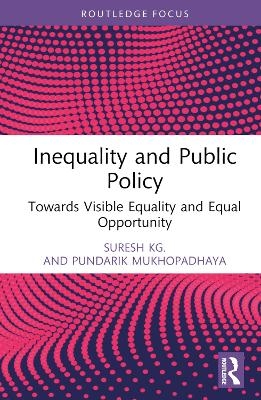
Inequality and Public Policy
Routledge (Verlag)
978-0-367-18128-4 (ISBN)
This book’s concern is with visible inequalities in housing, health, and education, and policy initiatives to address them.
The authors offer readers a summary of evidence on inequalities – not only in income, gender, and wealth but also in education, health, and housing. They showcase temporal and cross-country trends as well as the policy initiatives to minimize visible inequalities. The book also discusses policy initiatives and provides clarity on what works, what does not, and what may be of use when formulating public policies. Seventeen countries were chosen for focus based on their share in global population; of these, seven are given special focus, which together account for a little over half the world’s population.
Offering current research as well as insights into prospects for visible inequalities, the book is an essential read for students and professionals interested in the study of visible inequalities and equal opportunity.
Bhanoji Rao is presently Governing Board Member, GITAM, and IFHE, India. He was a faculty member at the University of Singapore (1967–1978), National University of Singapore (1985–2001), and the LKY School of Public Policy (2009–2011). He served as a World Bank Economist during 1979–1985. He has authored and edited several books and monographs, as well as several journal articles. Suresh K.G. teaches economics at the Indian Institute of Management (IIM), Bodh Gaya, Bihar, India. He holds a PhD in the area of Economics and an MPhil in the area of Management. His research articles appeared in international peer-reviewed journals like Economic Modelling, Empirical Economics, Journal of Quantitative Economics, and Economic and Political Weekly. Pundarik Mukhopadhaya is Professor of Economics at Macquarie University, Australia. He previously served as a consultant at the ADB, World Bank, and UNESCO. His research focuses on the measurement of social welfare, economic inequality, poverty, gender disparity, and economic sustainability in developing and developed countries. He has authored 3 books and over 80 research papers in reputed journals and edited books.
Contents
Front Note
Chapter 1: Introduction and Motivation
Chapter 2: Housing
Chapter 3: Health
Chapter 4: Education
Chapter 5: Women Empowerment
Chapter 6: Hope for the Future
References
Annexes
Annex 1: The Sustainable Development Goals
Annex 2: Social and Economic Indicators Compiled by the United Nations, the World Bank, and IISS
Annex 3: A Note on the Social Progress Index
Annex 4: Income and Wealth Inequality: Trends and Policy Perspectives
Annex 5: Adequate Housing is a Human Right
Annex 6: The UN System
Annex 7: Future of the UN System: Possibilities for Consideration
Statistical Annex
Table 1: Water, Sanitation and Health Indicators, 2022
Table 2: Out of pocket expense, and data on physicians and nurses
Table 3: Incidence of Tuberculosis and Diabetes, 2021
Table 4: Health system ranks
Table 5: Countries with highest to lowest health expenditure % of GDP
Table 6: Top 64 countries on life expectancy (LE) and rank (R)
Table 7: Educational access equality and % with no schooling, 2022
Table 8: World Economic Forum’s Global Gender Gap Index: Components and Weights
Table 9: Net Food Trade and Food Security Index
| Erscheinungsdatum | 03.01.2024 |
|---|---|
| Reihe/Serie | Routledge Studies in the Modern World Economy |
| Zusatzinfo | 45 Tables, black and white |
| Verlagsort | London |
| Sprache | englisch |
| Maße | 138 x 216 mm |
| Gewicht | 344 g |
| Themenwelt | Sozialwissenschaften ► Soziologie ► Spezielle Soziologien |
| Wirtschaft ► Volkswirtschaftslehre ► Makroökonomie | |
| ISBN-10 | 0-367-18128-2 / 0367181282 |
| ISBN-13 | 978-0-367-18128-4 / 9780367181284 |
| Zustand | Neuware |
| Haben Sie eine Frage zum Produkt? |
aus dem Bereich


